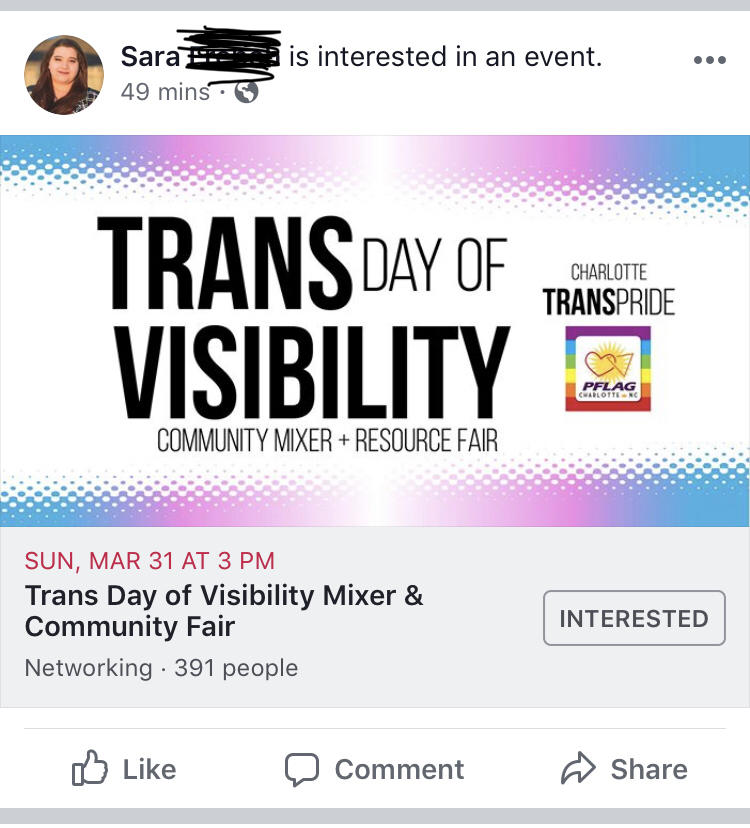Invasion of Privacy… or not?

Social Responsibility
The connection being made between one’s online activity and how the internet takes this online activity and tailors’ the information you see on your media pages is happening in our everyday lives. Liking a page on Facebook turns into more pages like these being recommended to you and now you have submerged yourself into things tailored for your appeal. This happens with our news information as well. This feature keeps us divided and indulged in our own views. I think the algorithms that go into making sure you constantly see preferable news is amazing. You even see this in Netflix after I finish a show they recommend one right after it. I will even have a category called “because you watched….” and it will be movies similar to ones I enjoy.
The Growth of Social Media
Social media is a growing force in this generation. Individuals use social media for leisure, connection, and research. “About seven-in-ten American adults (69%) now report they use some kind of social media platform (not including YouTube). The growth has come across all demographic groups and includes 37% of those ages 65 and older.” (Rainie) Social media is being used by all demographics and it’s important to be aware of entails using this media. people participate in civic and political activities, launch and sustain protests, get and share health information, gather scientific information, engage in family matters, perform job-related activities and get news. “As media continue to grow increasingly central to the civic functions of contemporary society, models for teaching and learning about media’s role in society have become more prominent in literature about media, education, and citizenship”. (Mihailidis) In order to understand the how media affects civic engagement we have to understand how and at what rate people are using the media.
Invasion of Privacy?
Is collecting personal information as a means of “providing a more intimate” platform tailored to your immediate likes an invasion of privacy? This connects to civic engagement because technology is only increasing and getting smarter. It is important for tech users to be aware of how the internet collects data and then redistributes it to us. Users should be mindful the personal information they enter when creating profiles on social media sites. One page we like generates into other pages of similar content showing up on our feed. We also have apps now that allow you to sign in through them using Facebook. I think this feature is good as long as we are aware of it and allow ourselves to be open to other things outside our immediate comfort zone.
…. Or Not?
Although platforms gathering information can seem like an invasion of privacy I think it is overall a beneficial feature. I even see this happening when I am placed in a group project where I don’t know anyone and exchange numbers. When I log onto Facebook I see the students I just met under “suggested friends”. Due to me having a smart phone just adding a students’ name and number also shows their profile on social media. This feature or “invasion of privacy” is what allows for deeper connections and networking to take place. “Social media data is likely the best representation of a user because it is a streaming record of their beliefs, attitudes and actions. No other source of data offers the same kind of granular detail into a person’s life. Organizations can use this data to get to know a person on an individual level”. (Snaptrends) As humans we want things to be personalized and these platforms are doing just that. Tailoring things to your likes allow you to have a more enjoyable experience on the web.
Value of Personal Data
No one wants to stream cat videos all day and then the next recommended video is about a mega church and then fake news. Yes, its great to be recommended things but you would have loved to seen another cat video. “Platforms can use data to produce better, more intelligent newsfeeds, which keep their user numbers high. Last year, Instagram became one of the most recent platforms, to roll out a newsfeed algorithm that prioritizes posts based on a number of factors, including user engagement history and perceived preferences. The more a social media app knows about you, the more personalized the content it can show you, and the more likely you’ll be to stick around and keep coming back”. (DeMers)
Personal Promoters
Having social media sites generate pages that appeal to you based on other pages you’ve liked can seem like an invasion of privacy but in reality, they are similar promoting material you already like. Allowing the social media site to be more enjoyable for you. If the content you see is not appealing to you then you may steer clear of the social media site. You may even like the content so much that you decide to share it with other people on your timeline. “In today’s digital culture, young people are immersed in social networks and mobile technologies to the extent that they are becoming the central facilitators for daily information and communication needs”. (Mihailidis) Although the site itself is generating content you like to see the other people on the platform that share the same ideals as you are creating and sharing posts.

The Daily Me
The Daily Me by Sustein describes the power of personalized social media accounts. Liking a page on Facebook turns into more pages like these being recommended to you and now you have submerged yourself into things tailored for your appeal. This happens with our news information as well. This feature keeps us divided and indulged in our own views. “When people use Facebook to see exactly what they want to see, their understanding of the world can be greatly affected. Your Facebook friends might provide a big chunk of the news on which you focus, and if they have a distinctive point of view, that’s the point of view that you’ll see most”. (Sustein, 2)
The Daily Me: Algorithms
I think the algorithms that go into making sure you constantly see preferable news is amazing. You even see this in Netflix after I finish a show they recommend one right after it. I will even have a category called “because you watched….” and it will be movies similar to ones I enjoy. “With the rise of artificial intelligence, algorithms are bound to improve immeasurably. They will learn a great deal about you, and they will know what you want or will like, before you do, and better than you do. They will even know your emotions, again before and better than you do, and they will be able to mimic emotions on their own”. (Sustein, 3) I think this feature is good as long as we are aware of it and allow ourselves to be open to other things outside our immediate comfort zone.
Echo Chambers
Social media is not being used to try to persuade or convert people from the opposing side. It also important to note the restrictions that come with social media like character count and you may not be following the right people with the information about social change. David Klatt within the article also reiterates this point, “Twitter, with its flame wars and character limits, is just not an optimal tool for persuasion”. (Parker, 3) The main point is that social media is great for reiterating ideals you already carry but not to persuade. In order to persuade someone to see your view and believe in your ideals is to be on the ground making a physical conscious effort. I can agree with the information presented in this article because social media great for when you see something that you agree with you can hit the like button or retweet it.
Echo Chambers: Interactions
If we’re constantly only interacting with our friends online then we’ll never grow or even attempt to understand the opposing side and vice versa. “It’s true that echo chambers can obstruct the flow of information, and that’s a problem. It’s true that echo chambers can obstruct the flow of information, and that’s a problem. But those echo chambers can also be a formidable tool for political resistance. Where else do you have such immediate access to hundreds, thousands or even millions formidable tool for political resistance. Where else do you have such immediate access to hundreds, thousands or even millions of people that agree with you? The key is to use social media for mobilization, not persuasion”. (Parker, 2) Most people spend all of their free time on social media so even though I agree with aspects of the article I disagree with thinking “on the ground” is the only way to convert people. It may be more effective but conversations can be jump started online as well.
Online connections through content
Social platforms connect users not just through instant messaging but through the content the site generates. As previously mentioned above you as a user and share the messages you are seeing on your page to your users and through that you are able to connect and talk about certain content with other users. “There is evidence that older social network users perceive higher levels of support and feelings of connectedness to a network of friendship than older nonsocial network users”. (Yu) The communication that takes place over shared interest in content is what allows users from all over whether you know each other or not to connect.


References
DeMers, J. (2017, January 23). Does Your Social Media App Know Too Much About You? Retrieved from https://www.forbes.com/sites/jaysondemers/2017/01/23/does-your-social-media-app-know-too-much-about-you/#335e2ba2487d
Mihailidis, P., Fincham, K., & Cohen, J. N. (2014). Toward a Media Literate Model for Civic Engagement in Digital Culture: Exploring the Civic Habits and Dispositions of College Students on Facebook. Atlantic Journal of Communication, 22(5), 293–309. https://doi-org.libproxy.uncg.edu/10.1080/15456870.2014.961400
Parker, E. (2017, May 22). In praise of echo chambers. The Washington Post. Retrieved from https://www.washingtonpost.com/news/democracy-post/wp/2017/05/22/in-praise-of-echochambers/?utm_term=.4657094cd971
Rainie, L., & Rainie, L. (2018, March 27). How Americans feel about social media and privacy. Retrieved from http://www.pewresearch.org/fact-tank/2018/03/27/americans-complicated-feelings-about-social-media-in-an-era-of-privacy-concerns/
Social Media Data Collection – Insights You Can Use. (2016). Retrieved from http://snaptrends.com/social-media-software/data-collection/
Sunstein, C. R. (2017). #Republic: Divided Democracy in the Age of Social Media. New Jersey, NJ: Princeton University Press.
Yu, R. P., Ellison, N. B., & Lampe, C. (2018). Facebook Use and Its Role in Shaping Access to Social Benefits among Older Adults. Journal of Broadcasting & Electronic Media, 62(1), 71–90. https://doi-org.libproxy.uncg.edu/10.1080/08838151.2017.1402905